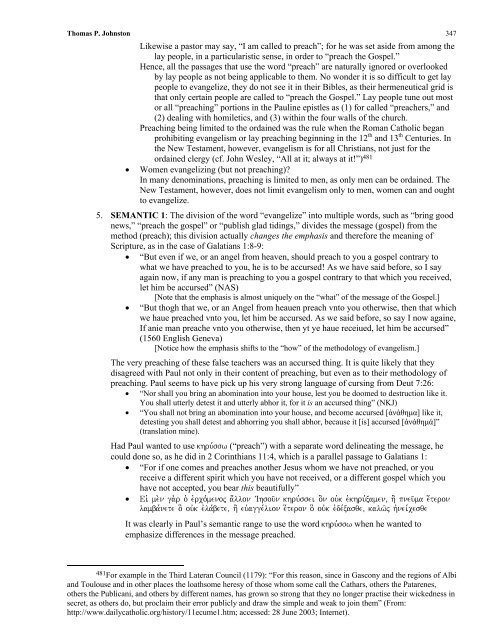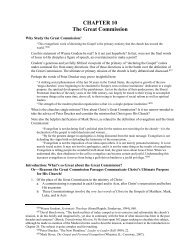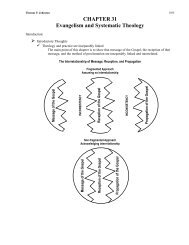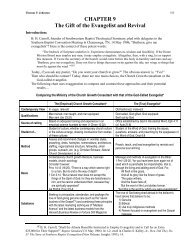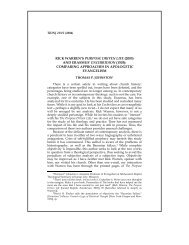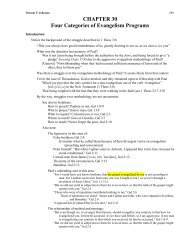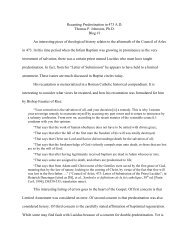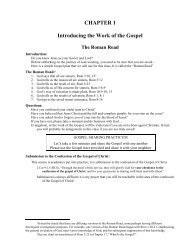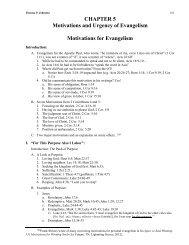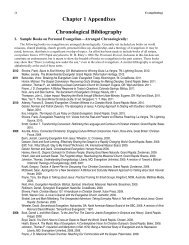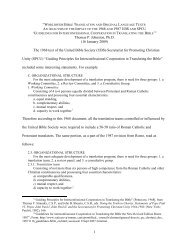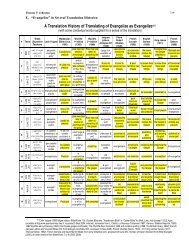CHAPTER 7 Defining Evangelizing - Evangelism Unlimited
CHAPTER 7 Defining Evangelizing - Evangelism Unlimited
CHAPTER 7 Defining Evangelizing - Evangelism Unlimited
You also want an ePaper? Increase the reach of your titles
YUMPU automatically turns print PDFs into web optimized ePapers that Google loves.
Thomas P. Johnston 347<br />
Likewise a pastor may say, “I am called to preach”; for he was set aside from among the<br />
lay people, in a particularistic sense, in order to “preach the Gospel.”<br />
Hence, all the passages that use the word “preach” are naturally ignored or overlooked<br />
by lay people as not being applicable to them. No wonder it is so difficult to get lay<br />
people to evangelize, they do not see it in their Bibles, as their hermeneutical grid is<br />
that only certain people are called to “preach the Gospel.” Lay people tune out most<br />
or all “preaching” portions in the Pauline epistles as (1) for called “preachers,” and<br />
(2) dealing with homiletics, and (3) within the four walls of the church.<br />
Preaching being limited to the ordained was the rule when the Roman Catholic began<br />
prohibiting evangelism or lay preaching beginning in the 12 th and 13 th Centuries. In<br />
the New Testament, however, evangelism is for all Christians, not just for the<br />
ordained clergy (cf. John Wesley, “All at it; always at it!”) 481<br />
Women evangelizing (but not preaching)?<br />
In many denominations, preaching is limited to men, as only men can be ordained. The<br />
New Testament, however, does not limit evangelism only to men, women can and ought<br />
to evangelize.<br />
5. SEMANTIC 1: The division of the word “evangelize” into multiple words, such as “bring good<br />
news,” “preach the gospel” or “publish glad tidings,” divides the message (gospel) from the<br />
method (preach); this division actually changes the emphasis and therefore the meaning of<br />
Scripture, as in the case of Galatians 1:8-9:<br />
“But even if we, or an angel from heaven, should preach to you a gospel contrary to<br />
what we have preached to you, he is to be accursed! As we have said before, so I say<br />
again now, if any man is preaching to you a gospel contrary to that which you received,<br />
let him be accursed” (NAS)<br />
[Note that the emphasis is almost uniquely on the “what” of the message of the Gospel.]<br />
“But thogh that we, or an Angel from heauen preach vnto you otherwise, then that which<br />
we haue preached vnto you, let him be accursed. As we said before, so say I now againe,<br />
If anie man preache vnto you otherwise, then yt ye haue receiued, let him be accursed”<br />
(1560 English Geneva)<br />
[Notice how the emphasis shifts to the “how” of the methodology of evangelism.]<br />
The very preaching of these false teachers was an accursed thing. It is quite likely that they<br />
disagreed with Paul not only in their content of preaching, but even as to their methodology of<br />
preaching. Paul seems to have pick up his very strong language of cursing from Deut 7:26:<br />
“Nor shall you bring an abomination into your house, lest you be doomed to destruction like it.<br />
You shall utterly detest it and utterly abhor it, for it is an accursed thing” (NKJ)<br />
“You shall not bring an abomination into your house, and become accursed [ἀνάθημα] like it,<br />
detesting you shall detest and abhorring you shall abhor, because it [is] accursed [ἀνάθημά]”<br />
(translation mine).<br />
Had Paul wanted to use khru,ssw (“preach”) with a separate word delineating the message, he<br />
could done so, as he did in 2 Corinthians 11:4, which is a parallel passage to Galatians 1:<br />
“For if one comes and preaches another Jesus whom we have not preached, or you<br />
receive a different spirit which you have not received, or a different gospel which you<br />
have not accepted, you bear this beautifully”<br />
Eiv me.n ga.r o` evrco,menoj a;llon VIhsou/n khru,ssei o]n ouvk evkhru,xamen( h' pneu/ma e[teron<br />
lamba,nete o] ouvk evla,bete( h' euvagge,lion e[teron o] ouvk evde,xasqe( kalw/j hvnei,cesqe<br />
It was clearly in Paul’s semantic range to use the word khru,ssw when he wanted to<br />
emphasize differences in the message preached.<br />
481 For example in the Third Lateran Council (1179): “For this reason, since in Gascony and the regions of Albi<br />
and Toulouse and in other places the loathsome heresy of those whom some call the Cathars, others the Patarenes,<br />
others the Publicani, and others by different names, has grown so strong that they no longer practise their wickedness in<br />
secret, as others do, but proclaim their error publicly and draw the simple and weak to join them” (From:<br />
http://www.dailycatholic.org/history/11ecume1.htm; accessed: 28 June 2003; Internet).


